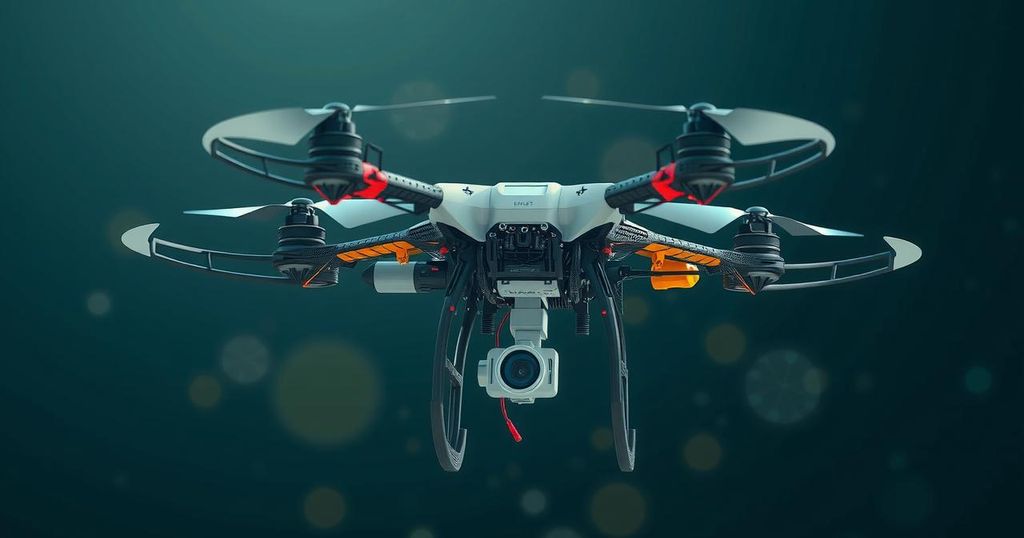Innovative Collaboration Between Sweden and Colombia: The Combat Climate Change UAV Project

The Combat Climate Change (C-3) UAV Project is a collaborative initiative between Sweden and Colombia, involving Saab, EAFIT University, and KTH Royal Institute of Technology. This project features the development of an unmanned aerial vehicle (UAV) to collect data on greenhouse gas emissions and assess ecosystem health, enhancing climate research and monitoring efforts amidst growing environmental challenges.
In an urgent response to the challenges posed by climate change, a pioneering initiative known as the Combat Climate Change (C-3) UAV Project has emerged through a collaborative effort between Sweden and Colombia. Spearheaded by Sweden’s Minister for Climate and the Environment, Romina Pourmokhtari, and Colombia’s Minister of Science, Yesenia Olaya, alongside Saab, EAFIT University in Colombia, and KTH Royal Institute of Technology in Sweden, this project revolves around the development of an unmanned aerial vehicle (UAV) designed to enhance climate research. The collaboration was officially unveiled during COP16 and showcases a significant partnership among the involved nations dedicated to tackling environmental challenges through technological innovation. The UAV is specifically engineered to gather data on greenhouse gas emissions, including carbon dioxide and methane, along with various pollutant metrics in the atmosphere. Additionally, it has the capability to monitor the ecological health of areas such as the Amazon rainforest and other vital ecosystems, assessing changes in vegetation and soil conditions. By integrating airborne data with existing satellite observations, the project aspires to refine mathematical and AI-driven climate prediction models, thereby enriching the understanding and management of the complexities inherent in the global climate system. Minister Yesenia Olaya expressed, “Contributing to mitigating climate change is one of the priorities of President Petro’s government… Monitoring biodiversity and climate change will help us anticipate and find solutions from science, technology and innovation to the challenges that this poses.” Furthermore, Eva Axelsson, Head of Group Sustainability at Saab, emphasized that “innovation and cooperation are key to counter climate change, while making people and society safe.” Since February 2023, a dedicated team of research engineers from KTH Royal Institute of Technology and EAFIT University has engaged in the design and construction of this advanced UAV, with Saab providing expert guidance to foster academic collaboration under the Triple Helix model, which aligns scientific, societal, and market interests. This commendable initiative not only foregrounds the importance of international cooperation in the face of climate change but also underscores the significance of technological advancements in facilitating environmental protection and fostering a sustainable future for all.
The Combat Climate Change (C-3) UAV Project is emblematic of the collaborative efforts between Sweden and Colombia to confront the multifaceted challenges of climate change. As the urgency of environmental issues intensifies globally, this partnership emerges as a proactive model for leveraging technology to enhance climate research and monitoring. The project combines expertise from academia, industry, and government, showcasing how international cooperation can catalyze innovative solutions to pressing climate concerns. The UAV’s capability to monitor greenhouse gas emissions and assess ecosystem health establishes it as a significant tool in the quest for sustainable environmental management.
The Combat Climate Change (C-3) UAV Project marks a significant advancement in the partnership between Sweden and Colombia aimed at addressing climate change. By utilizing cutting-edge technology, this initiative seeks to gather essential data to enhance environmental research and modeling. As expressed by both Ministers involved, the project reflects a shared commitment to organizational cooperation and the critical role of innovation in combating climate challenges. Through the collective efforts of governmental agencies and academic institutions, the C-3 initiative sets a precedent for future environmental collaborations.
Original Source: www.saab.com







